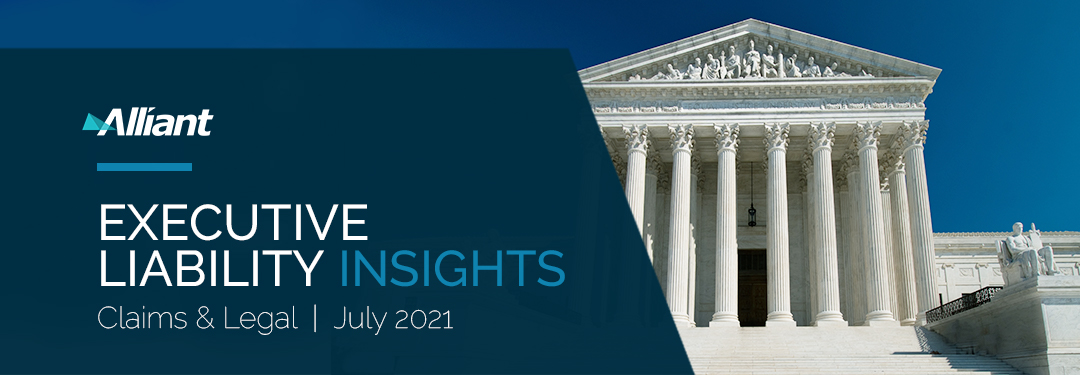
Navigating today’s complex risk environment can be a monumental task. Steve Shappell, Alliant Claims & Legal, spearheads Executive Liability Insights, a monthly review of news, legal developments and information on executive liability, cyber risk, employment practices liability, class action trends and more.
Table of Contents
COVERAGE AFFORDED TO ‘INNOCENT’ INSURED UNDER PROFESSIONAL LIABILITY POLICY WHEN NAMED INSURED FAILS TO TIMELY REPORT CLAIM
Maxum Indem. Co. v. Colliers Int’l – Atlanta, LLC, No. 20-11964 (11th Cir. June 15, 2021)
In this case, a lawsuit was filed against a commercial real estate brokerage and its Senior Vice President (“SVP”) alleging professional negligence. The brokerage reported the suit to its professional liability policy on behalf of itself, but did not report the matter on behalf of the SVP. After the end of the policy period and extended reporting period, the SVP, upon learning of the insurance policy, reported the matter to the insurer on his own behalf. Coverage litigation ensued when the insurer asserted it had no duty to defend the brokerage nor the SVP due to late notice.
Read More >>
WRONGFUL DENIAL OF COVERAGE FOR OFFICER UNDER D&O POLICY DID NOT RISE TO LEVEL OF BAD FAITH
Scottsdale Ins. Co. v. McGrath, No. 19-cv-07477 (S.D.N.Y. Jul. 19, 2021)
This coverage dispute arose when a directors and officers liability (“D&O”) insurer denied coverage for a Side-A claim brought by a former co-manager of a joint venture. The insurer cited several policy provisions in support of its denial, but fundamentally, it did not consider the joint venture to be a covered subsidiary under the policy, and the co-manager was therefore not an insured person.
Read More >>
INTENT TO DECEIVE INSURER NOT REQUIRED TO TRIGGER WARRANTY EXCLUSION IN D&O POLICY WHEN MATERIAL INFORMATION IS OMITTED FROM APPLICATION
Shaut v. Nat’l Cas. Co., No. 110010 (Ohio Ct. App. Jul. 22, 2021)
The plaintiff in this action sought coverage under a directors and officers liability (“D&O”) policy for lawsuits arising from an alleged employment Ponzi scheme. The underlying suits alleged the employee plaintiffs were promised employment opportunities with several companies in exchange for significant personal investments in the companies, but instead their investments were used to pay the salaries and benefits of other employees.
Read More >>
DERIVATIVE COMPLAINT DISMISSED FOR SHAREHOLDERS’ FAILURE TO MAKE REQUISITE DEMAND ON BOARD TO INVESTIGATE CORPORATE COMMITMENT TO DIVERSITY
In Re: Danaher Corp. S’holder Derivative Litig., No. 20-cv-02445-TNM (D.D.C. June 28, 2021)
In the fall of 2020, two leading plaintiffs’ class action law firms filed several shareholder derivative actions in California and Washington, D.C. alleging lack of diversity on boards of publicly traded companies. In the subject complaint filed against the board of directors of a D.C.-based conglomerate, the plaintiffs alleged that despite publicly stating its commitment to effectively promote diversity throughout all levels of the organization, the company’s board still lacked any Black members.
Read More >>
INSURANCE DEFENSE OF CONSUMER PROTECTION VIOLATIONS BARRED UNDER CALIFORNIA INSURANCE CODE
Adir Int’l, LLC v. Starr Indem. & Liab. Co., No. 19-56320 (9th Cir. Apr. 15, 2021)
A retailer was sued by the California Attorney General for violating state consumer protection laws. The Attorney General alleged the retail chain exploited low-income, foreign speaking consumers with unfair and misleading business practices and sought restitution, civil penalties, costs of suit, and other equitable relief.
Read More >>
EXCESS D&O INSURER CAN RECOUP COSTS SIDE-A INSURER SHOULD HAVE PAID
XL Specialty Ins. Co. v. AIG Specialty Ins. Co., No. 2:20-cv-06540 (C.D. Cal. Jul. 19, 2021)
A California federal court recently ruled that a directors and officers liability (“D&O”) insurer should have paid its additional Side-A limit to defend and settle several claims.
Read More >>
POLLUTION EXCLUSION IN D&O POLICY BARS COVERAGE FOR CLAIM ARISING FROM ALLEGED CONSPIRACY TO SUBMIT FRAUDULENT REGULATORY FILINGS
Barber v. Arch Ins. Co., No. 20-6307 (6th Cir. Jul. 7, 2021)
A federal grand jury indicted several employees of a Kentucky-based coal company for allegedly conspiring to falsify coal dust samples. The employees sought a defense against the charges from the company's directors and officers liability (“D&O”) policy, which provided that the insurer would pay defense costs related to a criminal proceeding resulting from an employee's wrongful acts. The insurer declined to cover the employees' claims, however, arguing the D&O policy’s pollution exclusion barred coverage, and litigation ensued.
Read More >>
BROKERAGE COMPANY AGREES TO PAY RECORD FINRA PENALTY
The Financial Industry Regulatory Authority (“FINRA”) recently fined an institutional brokerage company for "systemic supervisory failures" that the regulator says harmed millions of customers. The company, which provides online and mobile application-based discount stock brokerage solutions, failed to exercise due diligence when approving customers for the service, FINRA said, leading to thousands of customers being improperly approved for trading options.
Read More >>
INCREASING SPAC ACTIVITY TRIGGERS HEIGHTENED SCRUTINY OF INVOLVED ENTITIES AND INDIVIDUALS
Over the past two years, special-purpose acquisition companies (“SPACs”), or "blank check companies" as they are sometimes called, have been growing in popularity as way for high-profile investors and firms to put capital to use. As a result of SPAC popularity, it should not be a surprise that shareholders and the U.S. Securities and Exchange Commission (“SEC”) are taking an aggressive approach to the regulations associated with SPAC-related activities in the financial marketplace.
Read More >>
D&O INSURER HAS DUTY TO DEFEND EVEN WHERE ALLEGATIONS MAY INVOLVE DIRECTORS’ CAPACITY AS SHAREHOLDERS OF NON-INSURED ENTITY
Spicer v. Nat'l Union Fire Ins. Co. of Pittsburgh, Pa., No. 1:20-cv-3784-GHW (S.D.N.Y. Jul. 3, 2021)
In the underlying matter, which arose in connection with the sale of a company, former shareholders of the company sued the acquiring company regarding the application of an earnout provision in the purchase and sale agreement. The acquiring company filed a counterclaim against three of the purchased company’s shareholders, alleging that 1) as executives of the subsidiary they knowingly made material misrepresentations regarding a significant liability that was masked in the financial statements; and 2) as shareholders of the parent company, the individuals aided and abetted in its fraud by materially misrepresenting the financial condition of the parent company.
Read More >>
SECURITIES FRAUD DISMISSAL UPHELD BY 6TH CIRCUIT BECAUSE SCIENTER NOT ADEQUATELY PLED
Pittman v. Unum Group, No. 20-5710 (6th Cir. June 28, 2021)
In this matter, an insurance company sold long-term-care policies designed to cover costs associated with aging. Like many other insurance companies in the industry, the company based their pricing on inaccurate assumptions that caused most long-term-care policies to become unprofitable. When the company’s stock dipped after it announced a review that led to a substantial increase to its long-term-care reserves, a putative class action lawsuit was filed on behalf of investors.
Read More >>
CYBER CORNER
Click to Read the Following Articles:
- Landry’s Inc. v. The Ins. Co. of the State of Pa., No. 19-20430 (5th Cir. Jul. 21, 2021)
- SOFTWARE VENDOR HACK HIGHLIGHTS IMPORTANCE OF VENDOR MANAGEMENT
- West Bend Mutual Ins. Co. v. Krishna Schaumburg Tan, Inc., No. 125978 (Ill. May 20, 2021)
EPL CORNER
Click to Read the Following Articles:
-
Ferra v. Loews Hollywood Hotel LLC, No. S259172 (Cal. S. Ct. Jul. 15, 2021)
- RIDE SHARING COMPANY SETTLES WITH GIG WORKERS OVER PAID LEAVE MISHAPS
SEC CORNER
Click to Read the Following Articles:
- Cato Institute v. SEC, et al., No. 20-5054 (D.C. Cir. Jul. 6, 2021)
- SEC v. Collector's Coffee Inc., et al., No. 19-cv-04355 (S.D.N.Y. Jul. 21, 2021)
- SEC v. Fowler, No. 20-1081-cv (2nd Cir. Jul. 22, 2021)
SHAREHOLDER CORNER
FINANCIAL R&R PODCAST
COVERAGE AFFORDED TO ‘INNOCENT’ INSURED UNDER PROFESSIONAL LIABILITY POLICY WHEN NAMED INSURED FAILS TO TIMELY REPORT CLAIM
Maxum Indem. Co. v. Colliers Int’l – Atlanta, LLC, No. 20-11964 (11th Cir. June 15, 2021)
In this case, a lawsuit was filed against a commercial real estate brokerage and its Senior Vice President (“SVP”) alleging professional negligence.
The brokerage reported the suit to its professional liability policy on behalf of itself, but did not report the matter on behalf of the SVP. After the end of the policy period and extended reporting period, the SVP, upon learning of the insurance policy, reported the matter to the insurer on his own behalf. Coverage litigation ensued when the insurer asserted it had no duty to defend the brokerage nor the SVP due to late notice.
The SVP argued the policy’s innocent insured provision excused him from the brokerage’s failure to abide by the reporting requirements. The innocent insured provision provided that when coverage under the policy may be excluded or lost as a result “of noncompliance with any condition relating to the giving of notice to [the insurer] with respect to which any other ‘insured’ shall be in default solely because of the failure to give such notice or concealment of such failure by one or more ‘insureds’ responsible for the loss or damage otherwise insured hereunder[,] ... such failure to give notice provided that if the condition be one with which such ‘insured’ can comply, after receiving knowledge thereof, the ‘insured’ entitled to the benefit of this Section shall comply with such condition promptly after obtaining knowledge of the failure of any other ‘insured’ to comply therewith.”
The Eleventh Circuit, in reversing a lower court’s decision, sided with the SVP. Notwithstanding the claims-made-and-reported nature of the policy, the court looked to the ambiguity of the policy language, finding “the only reasonable interpretation of the Innocent Insured Provision is that it applies to instances where an innocent insured would lose coverage due to another insured’s failure to comply with the requirements surrounding the transfer of information about a claim, including the reporting requirements.”

The Takeaway
Timely and accurate noticing of claims under claims-made-and-reported policies is vital to securing coverage and avoiding litigation. Nevertheless, it is critical to ensure such policies have broad innocent insured and severability provisions, which not only protect innocent insureds against late notice and reporting issues, but also mitigate the risk of those insureds losing coverage through imputation of another insured’s bad acts.
WRONGFUL DENIAL OF COVERAGE FOR OFFICER UNDER D&O POLICY DID NOT RISE TO LEVEL OF BAD FAITH
Scottsdale Ins. Co. v. McGrath, No. 19-cv-07477 (S.D.N.Y. Jul. 19, 2021)
This coverage dispute arose when a directors and officers liability (“D&O”) insurer denied coverage for a Side-A claim brought by a former co-manager of a joint venture. The insurer cited several policy provisions in support of its denial, but fundamentally, it did not consider the joint venture to be a covered subsidiary under the policy, and the co-manager was therefore not an insured person.
Within weeks of issuing its denial, the D&O insurer filed suit in the U.S. District Court for the Southern District of New York, seeking to avoid coverage for a seven-figure settlement entered into between the co-manager and the bankruptcy trustee. The court initially ruled in favor of the co-manager, finding that because the joint venture was fifty percent owned by the named organization on the policy, the entity met the definition of “Subsidiary” and the co-manager of the joint venture was therefore an “Insured Person.”
The co-manager then filed a counterclaim alleging the insurer’s denial of coverage was in bad faith and he was therefore entitled to extra-contractual damages, including consequential and punitive damages. In support of his position, the co-manager alleged the insurer failed to provide a defense, frustrated his attempts to settle the claim early by “knowingly or recklessly disregard[ing] facts supporting his status as an insured,” and “willfully, knowingly and fraudulently collude[ing] to hide the existence of the policy” in order to avoid covering claims made against the co-manager.
The court disagreed, however, ruling in favor of the insurer and finding the co-manager did not identify sufficient facts to sustain a claim for bad faith denial of coverage or to support the allegation that the insurer wrongfully frustrated his ability to settle. According to the court, “there remains a strong presumption in New York against a finding of bad faith liability by an insurer.” While the court determined the co-manager and the insurer each had “powerful arguments” as to whether the co-manager was an insured under the D&O policy, it noted the insurer’s arguments–which the court ultimately rejected–were “far from unreasonable.” Specifically, the contract language favored the co-manager, but in the court’s view, “that is not to say that a reasonable lawyer could not have reached a contrary judgment.”

The Takeaway
In light of the court’s ruling on the bad faith claim, the co-manager is limited to pursuit of a breach of contract claim where he may ultimately recover damages limited to his defense and the settlement. This seems like a harsh result and New York law appears to present a challenge for claimants seeking to pursue bad faith damages. In this case, the insurer commenced the coverage action and chose to file the lawsuit in New York. Insureds considering coverage litigation would likely benefit from moving first, which can offer the opportunity to consider which jurisdiction or venue may be most favorable to their claim.
INTENT TO DECEIVE INSURER NOT REQUIRED TO TRIGGER WARRANTY EXCLUSION IN D&O POLICY WHEN MATERIAL INFORMATION IS OMITTED FROM APPLICATION
Shaut v. Nat’l Cas. Co., No. 110010 (Ohio Ct. App. Jul. 22, 2021)

The plaintiff in this action sought coverage under a directors and officers liability (“D&O”) policy for lawsuits arising from an alleged employment Ponzi scheme. The underlying suits alleged the employee plaintiffs were promised employment opportunities with several companies in exchange for significant personal investments in the companies, but instead their investments were used to pay the salaries and benefits of other employees.
The D&O insurer denied coverage because the underlying suits all related back to several unreported matters that constituted a single claim first made prior to the policy period under which the new suits were noticed (“current policy”), and which were not timely reported under the earlier, correct policy. The insurer also cited the current policy’s warranty exclusion, which provided that “in the event the application contains any misrepresentation or omission made with the intent to deceive, or contains any misrepresentation or omission which materially affects either the acceptance of the risk or the hazard assumed by the Insurer under this Policy, this Policy, including each and all Coverage Sections, shall not afford coverage.”
Coverage litigation ensued and the plaintiff argued that any discrepancies in the application were unintentional. In evaluating coverage, the appellate court determined that under the terms of the warranty exclusion, it was incumbent upon the insurer to show either an intent to deceive or that any misrepresentation or omission in the application materially affected its acceptance of the risk. Furthermore, “a fact contained in an insurance application is material if ‘the knowledge or ignorance’ of the fact ‘would naturally influence the judgment of the underwriter in making the contract at all, or in estimating the degree and character of the risk, or in fixing the rate of the premium,’” the court noted. Since the insurer asserted it would have evaluated the risk much differently in underwriting the current policy had it known about the unreported matters, the appellate court found in favor of the insurer, upholding a lower court’s ruling that the omission in the application was material. The court also found that the underlying suits arose from the same wrongful acts that were first alleged in the unreported suits, and were therefore made prior to the current policy period.
DERIVATIVE COMPLAINT DISMISSED FOR SHAREHOLDERS’ FAILURE TO MAKE REQUISITE DEMAND ON BOARD TO INVESTIGATE CORPORATE COMMITMENT TO DIVERSITY
In Re: Danaher Corp. S’holder Derivative Litig., No. 20-cv-02445-TNM (D.D.C. June 28, 2021)

In the fall of 2020, two leading plaintiffs’ class action law firms filed several shareholder derivative actions in California and Washington, D.C. alleging lack of diversity on boards of publicly traded companies. In the subject complaint filed against the board of directors of a D.C.-based conglomerate, the plaintiffs alleged that despite publicly stating its commitment to effectively promote diversity throughout all levels of the organization, the company’s board still lacked any Black members.
The plaintiffs alleged breach of fiduciary duty, unjust enrichment, and violations of Section 14(a) of the Securities Exchange Act of 1934, but the director defendants argued the plaintiffs failed to properly plead demand futility and no pre-litigation demand was made upon the board. The U.S. District Court for the District of Columbia recognized that the “demand requirement implements the basic principle of corporate governance that the decisions of a corporation—including the decision to initiate litigation—should be made by the board of directors or the majority of shareholders.” The court therefore evaluated whether the demand on the board would have been futile, thus relieving the plaintiffs of the demand pre-requisite.
When considering the allegations that the board breached their fiduciary duties, the court noted the plaintiffs’ arguments focused specifically on a breach of the duty of loyalty. The court rejected contentions that any of the alleged statements made in connection with the company’s commitment to diversity were false; to the contrary, statements about the diversity of the company’s workforce, which the court found to be relatively true, said nothing about diversity on the board. With respect to the unjust enrichment claim, the court found the demand futility requirement had not been met because the complaint failed to draw a connection between director compensation and the alleged wrongful conduct. As such, the plaintiffs could not move forward with the unjust enrichment claim. Finally, the plaintiffs attempted to draw a causal connection between alleged false statements in corporate proxy statements and how such statements caused Black candidates to be excluded from the pool. The court found no such connection, however, and therefore concluded the Section 14(a) claims could not proceed because the complaint failed to allege particularized facts showing the director defendants faced a substantial threat of personal liability.
The Takeaway
The cluster of shareholder derivative complaints filed by top tier plaintiff firms suggests this may only be the beginning when it comes to derivative demands on companies with non-diverse boards. Adequate policy limits for derivative demand investigation costs in directors and officers liability policies are essential and additional coverage for special litigation committee costs should be obtained, where possible.
INSURANCE DEFENSE OF CONSUMER PROTECTION VIOLATIONS BARRED UNDER CALIFORNIA INSURANCE CODE
Adir Int’l, LLC v. Starr Indem. & Liab. Co., No. 19-56320 (9th Cir. Apr. 15, 2021)
A retailer was sued by the California Attorney General for violating state consumer protection laws. The Attorney General alleged the retail chain exploited low-income, foreign speaking consumers with unfair and misleading business practices and sought restitution, civil penalties, costs of suit, and other equitable relief.

Initially, the retailer’s professional liability insurer agreed to provide coverage for the suit, but it later withdrew coverage after receiving a warning from the Attorney General’s office that, pursuant to California Insurance Code, insurers are barred from providing coverage in certain consumer protection cases brought by the state, including those for unfair competition and false advertising. California Insurance Code section 533.5 states “no policy of insurance shall provide, or be construed to provide, any duty to defend … any claim … in any action or proceeding brought pursuant to [false advertising law or unfair competition law] in which the recovery of a fine, penalty, or restitution is sought by the Attorney General.” The insurer subsequently stopped paying for defense costs and the retailer sued for coverage.
The retailer argued that section 533.5 deprives false advertising and unfair competition defendants of their right to counsel of their choice in violation of the federal Due Process Clause. The Ninth Circuit disagreed, declining “to enlarge the limited due process right to retain counsel to include a constitutional right to use insurance proceeds to pay for legal fees.” In finding the insurer was entitled to reimbursement of defense costs since there was no duty to defend or indemnify, the court noted the language of the statute regarding the duty to defend was clear and barred defense for “any claim,” including claims for non-monetary relief, thereby extending the statutory preclusion for defense coverage to claims for injunctive relief as well.
EXCESS D&O INSURER CAN RECOUP COSTS SIDE-A INSURER SHOULD HAVE PAID
XL Specialty Ins. Co. v. AIG Specialty Ins. Co., No. 2:20-cv-06540 (C.D. Cal. Jul. 19, 2021)
A California federal court recently ruled that a directors and officers liability (“D&O”) insurer should have paid its additional Side-A limit to defend and settle several claims.

The underlying suit arose after a private equity fund acquired a controlling interest in a beauty supply company and appointed five of its board members. These board member approved a loan, which ended up in default, resulting in the lender ultimately assuming control of the company and appointing a new board. When the lender sued the former directors and officers for breach of fiduciary duty in approving the loan, the company refused to advance defense costs on behalf of the ousted board members, who then sought coverage for their defense under the company’s D&O tower of insurance.
The parties ultimately settled, and while two primary insurers covered the bulk of the costs, additional costs were paid by the excess D&O insurer. The excess insurer filed suit against one of the primary insurers, seeking reimbursement under that policy’s Side-A coverage. The primary insurer countered that those costs should have been paid by the company, and cited an exclusion for actions taken outside of the insureds’ official capacity.
The court disagreed with the primary insurer, finding its policy’s Side-A coverage had been triggered and ordering it to reimburse the excess insurer. According to the court, the cited exclusion was inapplicable because the board members were acting in their official capacities for the beauty company when they approved the loan.
The Takeaway
Close attention must be paid to the “presumptive indemnification” wording in a D&O policy, which could preclude Side-A coverage if a company is deemed to have indemnified its directors and officers to the fullest extent permitted by law.
POLLUTION EXCLUSION IN D&O POLICY BARS COVERAGE FOR CLAIM ARISING FROM ALLEGED CONSPIRACY TO SUBMIT FRAUDULENT REGULATORY FILINGS
Barber v. Arch Ins. Co., No. 20-6307 (6th Cir. Jul. 7, 2021)

A federal grand jury indicted several employees of a Kentucky-based coal company for allegedly conspiring to falsify coal dust samples. The employees sought a defense against the charges from the company's directors and officers liability (“D&O”) policy, which provided that the insurer would pay defense costs related to a criminal proceeding resulting from an employee's wrongful acts. The insurer declined to cover the employees' claims, however, arguing the D&O policy’s pollution exclusion barred coverage, and litigation ensued.
The exclusion stated the insurer would not be liable for any claim "arising from, based upon, or attributable to" any discharge or threat of discharge of any pollutant or any "direction, request or voluntary decision" to test for or monitor any pollutant. According to the employees, since coal dust never left the mine, it was not a pollutant under the policy. Moreover, classifying coal dust as a pollutant would in essence render the policy useless and ineffective for the company or any other hazardous material businesses, the employees argued.
The Sixth Circuit sided with the insurer, holding the pollution exclusion precluded coverage of the criminal action. “The scope of this pollution exclusion is broader than usual because it includes claims arising from [the company’s] regulation of contaminants and irritants. Because coal dust contaminates and irritates, and because it is regulated by [the company], it fits comfortably within the exclusion's intended scope,” the court found. Therefore, the alleged criminal conduct was not covered under the policy because it was connected to the company's required submission of coal dust samples.
The Takeaway
While courts tend to give wide berth to insureds in finding that insurance companies owe a defense obligation, it appears they still have a distaste for doing so when there are criminal fraud implications. The language of the pollution exclusion at issue gave the court a way to find no coverage without getting into a full discussion of the parameters of the defense obligation under the D&O policy.
BROKERAGE COMPANY AGREES TO PAY RECORD FINRA PENALTY
The Financial Industry Regulatory Authority (“FINRA”) recently fined an institutional brokerage company for "systemic supervisory failures" that the regulator says harmed millions of customers.

The company, which provides online and mobile application-based discount stock brokerage solutions, failed to exercise due diligence when approving customers for the service, FINRA said, leading to thousands of customers being improperly approved for trading options. According to the order, the company misled customers about their ability to trade on margin, issued erroneous margin calls and margin call warnings to some customers, misrepresented the risks associated with certain options transactions, and failed to report tens of thousands of customer complaints to FINRA, all of which ultimately resulted in customers incurring millions of dollars in losses.
Without admitting or denying the allegations, the company agreed to pay a record $57 million fine in addition to $12.6 million in restitution. In a statement, Jessica Hopper, head of FINRA’s enforcement department, noted "this action sends a clear message — all FINRA member firms … must comply with the rules that govern the brokerage industry, rules which are designed to protect investors and the integrity of our markets. Compliance with these rules is not optional and cannot be sacrificed for the sake of innovation or a willingness to 'break things' and fix them later."
INCREASING SPAC ACTIVITY TRIGGERS HEIGHTENED SCRUTINY OF INVOLVED ENTITIES AND INDIVIDUALS
Over the past two years, special-purpose acquisition companies (“SPACs”), or "blank check companies" as they are sometimes called, have been growing in popularity as a way for high-profile investors and firms to put capital to use. As a result of SPAC popularity, it should not be a surprise that shareholders and the U.S. Securities and Exchange Commission (“SEC”) are taking an aggressive approach to the regulations associated with SPAC-related activities in the financial marketplace.
SEC v. Kokorich, No. 1:21-CV-1869, (D.D.C. Jul. 13, 2021)
In the first of many anticipated cases, the SEC recently brought an enforcement action against several participants in a de-SPAC transaction, including the SPAC, the SPAC's sponsor, the SPAC's CEO, the merger target, and the merger target's CEO.
According to the complaint, the merger target, a space infrastructure company, and its CEO misled the SPAC about the success of the company’s propulsion technology, which in reality did not demonstrate commercial viability. Additionally, the merger target and its CEO allegedly failed to make it clear that the CEO "faced multiple adverse determinations by U.S. government agencies because of concerns that he posed a risk to U.S. national security." As a result of these risks, the merger target was unlikely to be allowed to participate in U.S.-based rocket launches because the U.S. government had the authority to block the company's involvement for national-security reasons.
The SEC’s complaint also alleged that the SPAC, its sponsor, and the SPAC's CEO failed their due diligence obligations to investors by not reviewing the results of the merger target’s in-space test of its propulsion technology nor receiving sufficient documents to assesses the national security risks posed by its CEO. Instead, they repeated the merger target’s misleading statements in public filings, resulting in inaccurate registration statements and proxy solicitations. In a statement, SEC Chair Gary Gensler noted “the fact that [the merger target] lied to [the SPAC] does not absolve [the SPAC] of its failure to undertake adequate due diligence to protect shareholders.”
Rodriguez v. DraftKings Inc., et al., No. 21-cv-05739 (S.D.N.Y Jul. 2, 2021)
In another recent suit, a post-SPAC-merger company was hit with a securities class action lawsuit regarding alleged pre- and post-SPAC-merger activity of one of the merged companies.
Over a year after a three-way merger took place between a SPAC, an online sports betting company, and an international provider of sports gaming technologies, a report was released alleging the merger with the gaming technologies company exposed the online sports betting company to dealings in black-market gaming. As a result of the report, the online sports betting company’s share price fell.
The class action lawsuit alleges the sports betting company and several of its directors and officers, along with the SPAC and its pre-merger directors and officers, failed to disclose or misrepresented several critical facts that led the sports betting company’s share price to decline. Specifically, the complaint alleges the defendants violated Sections 10(b) and 20(a) of the Securities Exchange Act of 1934 and Rule 10b-5 thereunder.
The key facet of this suit is that it includes as defendants not only officers of the go-forward public company, but also individuals who served as officers of the pre-merger SPAC, and involves allegations of misconduct that took place prior to and after the merger. This suit is currently pending in federal court.
The Takeaway
SPACs are likely to face more regulatory and shareholder scrutiny as SPAC and de-SPAC activities continue to increase. As these cases demonstrate, however, the SPACs themselves are not the only ones facing scrutiny – SPAC sponsors, merger targets, advisors, officers, and affiliates will also be under investigation. SPACs, along with their sponsors, investors, and other involved parties must ensure they have taken the necessary steps to properly evaluate combination targets. Robust and thorough due diligence should be a priority to support representations made in all transactions.
Want to know more about SPACs? Please visit Alliant’s SPAC Podcast.
D&O INSURER HAS DUTY TO DEFEND EVEN WHERE ALLEGATIONS MAY INVOLVE DIRECTORS’ CAPACITY AS SHAREHOLDERS OF NON-INSURED ENTITY
Spicer v. Nat'l Union Fire Ins. Co. of Pittsburgh, Pa., No. 1:20-cv-3784-GHW (S.D.N.Y. Jul. 3, 2021)
In the underlying matter, which arose in connection with the sale of a company, former shareholders of the company sued the acquiring company regarding the application of an earnout provision in the purchase and sale agreement. The acquiring company filed a counterclaim against three of the purchased company’s shareholders, alleging that 1) as executives of the subsidiary they knowingly made material misrepresentations regarding a significant liability that was masked in the financial statements; and 2) as shareholders of the parent company, the individuals aided and abetted in its fraud by materially misrepresenting the financial condition of the parent company.

The shareholders tendered the counterclaim under the directors and officers liability (“D&O”) policy for the subsidiary, but the insurer denied the claim, saying the counterclaim was not brought against the individuals in their respective capacities as executives of the subsidiary and thus did not constitute a “Wrongful Act.” The insurer further cited the policy’s capacity exclusion, which precluded coverage for claims “alleging, arising out of, based upon or attributable to any actual or alleged act or omission of an Individual Insured serving in any capacity, other than as an Executive or Employee of a Company.”
Coverage litigation ensued and the U.S. District Court noted that the counterclaim asserted misrepresentations by the shareholders regarding the financial condition of both companies, and thus did “not expressly limit the liability” of the individuals to conduct committed in their roles as shareholders of the parent company. While the insurer maintained the individuals at least acted in a dual capacity as both directors and shareholders, the court found there remained legitimate questions of fact regarding the individuals’ capacity as to the conduct at issue in the counterclaim, noting there was “a reasonable possibility” the underlying claims were not excluded. “Because the Court cannot conclude with certainty that the policy does not provide coverage, [the insurer] has a contractual duty to defend the plaintiffs against the Counterclaims.”
SECURITIES FRAUD DISMISSAL UPHELD BY 6TH CIRCUIT BECAUSE SCIENTER NOT ADEQUATELY PLED
Pittman v. Unum Group, No. 20-5710 (6th Cir. June 28, 2021)

In this matter, an insurance company sold long-term-care policies designed to cover costs associated with aging. Like many other insurance companies in the industry, the company based their pricing on inaccurate assumptions that caused most long-term-care policies to become unprofitable. When the company’s stock dipped after it announced a review that led to a substantial increase to its long-term-care reserves, a putative class action lawsuit was filed on behalf of investors.
The suit alleged the company and certain current and former executives engaged in securities fraud by violating section 10(b) and rule 10(b)-5 of the Securities Exchange Act of 1934 when they misled shareholders about adverse experiences suffered by its closed block of long-term care insurance policies.
A lower court dismissed the suit, holding the plaintiffs failed to adequately allege a material misstatement or omission and scienter, both of which are required to establish a violation of rule 10(b)-5. Scienter, or a defendant's knowledge that an act or conduct is wrongful and intent to act despite this knowledge, is an important element of any securities fraud claim. Under rule 10(b)-5, a plaintiff must state, with particularity, facts giving rise to a strong inference that the defendant acted with fraudulent intent (i.e., scienter) when they made the alleged false or misleading statement.
On appeal the Sixth Circuit upheld the lower court’s dismissal, finding the investor plaintiffs had pled neither an actionable misstatement nor scienter. According to the court, the company disclosed accurate information about its reserves to investors, along with guidance about when a reserve reassessment might be necessary. The court also found the company acted in accordance with that guidance when market forces began to put pressure on reserves. “This is hardly the sort of behavior one would expect from the perpetrator of securities fraud,” the court noted, finding characterization of previously disclosed statistical facts is not securities fraud and fraudulent intent cannot be inferred purely from the executives’ positions within the company and their alleged access to information.
Shareholder Corner
JULY 2021 SECURITIES CLASS ACTION FILINGS*
Stable Road Acquisition Corp.^
Services
^denotes SPAC-related
*Source: Stanford Law School Securities Class Action Clearinghouse
ABOUT ALLIANT INSURANCE SERVICES
Alliant Insurance Services is the nation’s leading specialty broker. In the face of increasing complexity, our approach is simple: hire the best people and invest extensively in the industries and clients we serve. We operate through national platforms to all specialties. We draw upon our resources from across the country, regardless of where the resource is located.
Contributors

Abbe Darr, Esq.
Claims Attorney
abbe.darr@alliant.com
David Finz, Esq.
Claims Attorney
david.finz@alliant.com
Erica Ahern
Claims Advocate
erica.ahern@alliant.com
Jacqueline Noster, Esq.
Claims Attorney
jacqueline.noster@alliant.com
Jacqueline Vinar, Esq.
Claims Attorney
jacqueline.vinar@alliant.com
Jaimi Berliner, Esq.
Claims Attorney
jaimi.berliner@alliant.com
Katherine Puthota
Claims Advocate
katherine.puthota@alliant.com
Matia Marks, Esq.
Claims Attorney
matia.marks@alliant.com
Meaghan Fisher
Senior Claims Advocate
meaghan.fisher@alliant.com
Megan Padgett
Senior Claims Advocate
megan.padgett@alliant.com
Robert Aratingi
Senior Claims Advocate
robert.aratingi@alliant.com
Robert Hershkowitz, Esq.
Claims Attorney
robert.hershkowitz@alliant.com
Steve Levine, Esq.
Claims Attorney
slevine@alliant.com
Vanessa Gonzalez
Senior Claims Advocate
vanessa.gonzalez@alliant.com